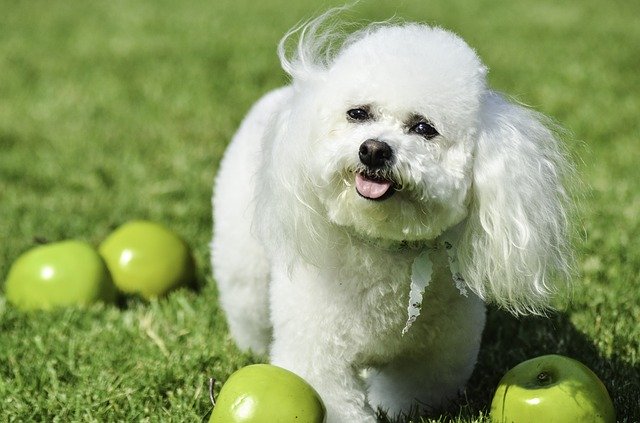Can dogs eat apples? The short answer is yes, dogs can eat apples, but there are some things you should know before feeding your dog with apples. Apples as fruits are rich with nutrients that can be beneficial to your dog’s health, but there are some dangers to watch out for, such as apple kernels and seeds.
As with any good thing, moderation is key, because too many apples can cause gastrointestinal upset in dogs. If you serve apples to your dog properly and safely, sometimes they are healthy – treats it can be very refreshing and delicious.
Dogs are allowed to eat apples and many delicious snacks of this fruit, both because of the taste and the texture Apple (without the central part – seeds) is a good source of vitamins and it is low in calories, so it is suitable as a treat for dogs.
Older dogs can be given even a well-chilled one, as a refreshment in the summer months. Unsweetened apple juice can be added to a meal as a “sweet” liquid supplement.
How good are apples for dogs?
Apples can be low-calorie snacks full of valuable nutrients that are good for dogs, making them a great choice as a snack or reward during training, as long as they are served in moderation. Apples have low ingredients in protein and high in fiber, which can be good for digestive health and can make them a good choice for dogs that have a restrictive diet that does not allow high protein and fat. This is especially useful in older dogs or dogs with certain diseases.
In the apples, there are a lot of vitamins A, C, and K, as well as calcium and phosphorus, soluble fiber, and it is low in calories. The antioxidants contained in these fruits can help protect against cancer and reduce the symptoms of joint disease. Eating apples can improve both a child’s health and breathing.
Good for teeth and anti-inflammatory You may not know it, but an apple is also a great healthy chewing gum for healthy teeth and fresh breath. Also, the apple alleviates inflammatory conditions, because this fruit is one of the best in the fight against free radicals. Only, take care of how much fruit you give to the dog, because in larger quantities it can cause diarrhea and other stomach problems.
When are apples bad for dogs?
The main things to watch out for when eating apples for dogs are seeds and kernels. Apple seeds have a lot of traces of cyanide, which is toxic. It would probably take a lot of seeds to cause any cyanide poisoning, and if your dog swallows a few seeds, it probably won’t cause harm. Still, there is no need to risk your dog’s health, so just remove the seeds before feeding your dog’s apples. Some suggest that apple stalks can be dangerous, so it is best to remove the stalks. Apple’s core is very firm and difficult for most dogs to chew. It may pose a risk of suffocation or, if swallowed, cause blockage of the gastrointestinal tract.
Apples contain sugar, as ingredients, so they should be served in defined doses. Sugar as an ingredient can be a problem in dogs suffering from cancer or diabetes, which is another reason why it is important to ask your veterinarian before giving apples to your dog. In addition, too many apples can cause an upset stomach or diarrhea, even in healthy dogs.
Apple-flavored products or products that contain apples often contain sugar, artificial flavors, or chemicals that harm dogs. Always read the labels before feeding your dog that contains apples and avoids added sugars, artificial sweeteners such as xylitol or ingredients you are unfamiliar with, as this can be toxic. It is best to choose organic apples, as many of the apples you find in the supermarket are coated with substances that make them shine. Clean the apples you buy, as they may contain herbicides or pesticides.
Like most foods, there is a risk that your dog will be allergic to apples. Rarely, an allergic reaction can lead to anaphylaxis, a potentially life-threatening condition. If you see signs of an allergic reaction in your dog, including cough, sneezing, swelling, rash, shortness of breath, or other symptoms, stop serving your apples and contact your veterinarian immediately.
How to give an apple to a dog?
Always ask your vet before sharing human food with your dogs. Some dog breeds have medical conditions that can be made worse by consuming apples. Once you are in order from your vet, make sure to wash the apples you intend to serve to your dog, remove the stems, seeds, and kernels of the apples, and cut them into bite-sized slices.
The apple is also rich in fiber, which contributes to better digestion and the proper functioning of the entire digestive tract. You can give the pieces of apple to the dog as a snack (between meals), or as a supplement to the meal (add the mashed apple to the granules).
There are many ways to serve apples to dogs. The apples can be frozen and served as a refreshing summer snack. You can mix the apples with your dog’s food for a sweet treat, can be smashed into a homemade apple, or can be mixed with other healthy fruits to make it taste smooth. There are many recipes for online recipes that include apples, so try a few and see what your dog wants.
We can offer the dogs to eat apples raw or cooked. For easier digestion and use of nutrients, the fruit should be processed – cut into smaller pieces, sticks or make something similar to a thick juice in a blender.
Before you give it to your dog, you must wash the apples well. And don’t peel them, because the bark contains fiber and antioxidants. It is recommended to use seasonal fruits and vegetables of organic origin (dogs are very sensitive to pesticides). The fruit must be ripe because otherwise, it can cause diarrhea.
Tip +
As a dessert, when eating commercial food, fruits, or vegetables are given in the amount of up to ten percent of the daily meal. If it is part of a meal in the form of freshly prepared food, then it can be represented by up to 25 percent, and if it is part of food given to a dog with a certain health problem – fruits and vegetables can be represented by up to 50 percent in a meal. Buy organic, unsprayed apples and give the dog pieces with peel because it contains fiber and antioxidants.





